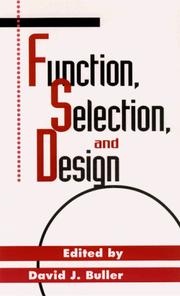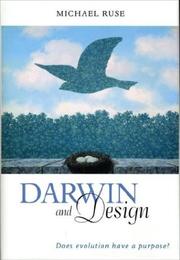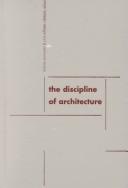| Listing 1 - 10 of 19 | << page >> |
Sort by
|

ISBN: 0791442128 079144211X Year: 1999 Volume: *2 Publisher: Albany, N.Y. State University of New York Press
Abstract | Keywords | Export | Availability | Bookmark
 Loading...
Loading...Choose an application
- Reference Manager
- EndNote
- RefWorks (Direct export to RefWorks)
Design (Philosophy) --- Final cause --- Teleologie --- Teleology --- Téléologie --- Biology --- Teleology. --- Philosophy. --- Philosophy --- Design in natural phenomena, Study of --- Causation --- Evolution --- Necessity (Philosophy) --- Vitalism
Book
ISBN: 9780262042918 0262042916 9780262354929 0262354926 0262354934 Year: 2019 Publisher: Cambridge, Massachusetts: MIT Press,
Abstract | Keywords | Export | Availability | Bookmark
 Loading...
Loading...Choose an application
- Reference Manager
- EndNote
- RefWorks (Direct export to RefWorks)
"What would keep the Bauhaus up at night if it were practicing today? A century after its founding by Walter Gropius in Weimar, Germany, as an 'experimental laboratory of the future,' who are the pioneering experimentalists who reinscribe or resist Bauhaus traditions? This book explores the varied legacies, influences, and futures of the Bauhaus. Many of the animating issues of the Bauhaus--its integration of research, teaching, and practice; its experimentation with materials; its democratization of design; its open-minded, heterogeneous approach to ideas, theories, methods, and styles--remain relevant. The contributors to Bauhaus Futures address these but go further, considering issues that design has largely ignored for the last hundred years: gender, race, ethnicity, class, sexuality, and disability. Their contributions take the form of essays, photo-essays, interviews, manifestos, diagrams, and even a play. They discuss, among other things, the Bauhaus curriculum and its contemporary offshoots; Bauhaus legacies at the MIT Media Lab, Black Mountain College, and elsewhere; the conflict between the Bauhaus ideal of humanist universalism and current approaches to design concerned with race and justice; designed objects, from the iconic to the precarious; textile and weaving work by women in the Bauhaus and the present day; and design and technology."--
Design --- Philosophy --- Social aspects --- Forecasting --- Bauhaus --- Philosophy. --- Social aspects. --- Forecasting. --- Bauhaus. --- Creation (Literary, artistic, etc.) --- Staatliches Bauhaus --- Baohaosi --- Bauhaus Dessau --- Design - Philosophy --- Design - Social aspects --- Design - Forecasting
Book
ISBN: 1447163370 1447163389 Year: 2014 Publisher: London : Springer London : Imprint: Springer,
Abstract | Keywords | Export | Availability | Bookmark
 Loading...
Loading...Choose an application
- Reference Manager
- EndNote
- RefWorks (Direct export to RefWorks)
While investigations into both theories and models has remained a major strand of engineering design research, current literature sorely lacks a reference book that provides a comprehensive and up-to-date anthology of theories and models, and their philosophical and empirical underpinnings; An Anthology of Theories and Models of Design fills this gap. The text collects the expert views of an international authorship, covering: · significant theories in engineering design, including CK theory, domain theory, and the theory of technical systems; · current models of design, from a function behavior structure model to an integrated model; · important empirical research findings from studies into design; and · philosophical underpinnings of design itself. For educators and researchers in engineering design, An Anthology of Theories and Models of Design gives access to in-depth coverage of theoretical and empirical developments in this area; for practitioners, the book will provide exposure to theoretical and empirical foundations to methods and tools that are currently practiced as well as those in the process of development.
Aesthetics. --- Design -- Philosophy. --- Design -- Technique. --- Engineering. --- Engineering design. --- Technology_xPhilosophy. --- Engineering design --- Civil & Environmental Engineering --- Engineering & Applied Sciences --- Civil Engineering --- Design --- Philosophy. --- Technique. --- Engineering Design. --- Philosophy of Technology. --- Mental philosophy --- Humanities --- Design, Engineering --- Engineering --- Industrial design --- Strains and stresses
Book
ISBN: 0262346079 0262037807 0262346087 9780262346078 9780262037808 Year: 2018 Publisher: Cambridge, Massachusetts : The MIT Press,
Abstract | Keywords | Export | Availability | Bookmark
 Loading...
Loading...Choose an application
- Reference Manager
- EndNote
- RefWorks (Direct export to RefWorks)
Principles for designing educational games that integrate content and play and create learning experiences connecting to many areas of learners' lives.
Video games in education. --- Education Arcade (Project) --- Audio-visual education --- Massachusetts Institute of Technology. --- GAME STUDIES/Games in Education --- EDUCATION/General --- GAME STUDIES/Video Game Programming --- Electronic games in education --- education --- videogame design --- constructivist --- pedagogy --- design philosophy

ISBN: 067401023X 9780674010239 0674016319 9780674016316 Year: 2003 Publisher: Cambridge (Mass.): Harvard university press,
Abstract | Keywords | Export | Availability | Bookmark
 Loading...
Loading...Choose an application
- Reference Manager
- EndNote
- RefWorks (Direct export to RefWorks)
"Darwin and Design surveys the argument from design from its introduction by the Greeks, through the coming of Darwinism, down to the present day. In clear, non-technical language Michael Ruse, a well-known authority on the history and philosophy of Darwinism, offers a full and fair assessment of the status of the argument from design in light of both the advances of modern evolutionary biology and the thinking of today's philosophers - with special attention given to the supporters and critics of "intelligent design."" "The first comprehensive history and exposition of Western thought about design in the natural world, this important work suggests directions for our thinking as we move into the twenty-first century. A thoroughgoing guide to a perennially controversial issue, the book makes its own substantial contribution to the ongoing debate about the relationship between science and religion, and between evolution and its religious critics."--Jacket.
Philosophy of nature --- Philosophy of science --- Design (Philosophy) --- Final cause --- Teleologie --- Teleology --- Téléologie --- Evolution (Biology) --- Teleology. --- Philosophy. --- GBZ General Biology, Zoology & Biophilosophy --- adaptation and evolution --- darwinism --- evolution --- structure and function --- 575.8 --- -Teleology --- #WSCH:AAS2 --- Design in natural phenomena, Study of --- Philosophy --- Causation --- Evolution --- Necessity (Philosophy) --- Evolution. Origin of species. Phylogeny --- 575.8 Evolution. Origin of species. Phylogeny --- Evolution (Biology) - Philosophy. --- Biological Evolution

ISBN: 0816636656 0816636648 9780816636655 Year: 2001 Publisher: Minneapolis: University of Minnesota press,
Abstract | Keywords | Export | Availability | Bookmark
 Loading...
Loading...Choose an application
- Reference Manager
- EndNote
- RefWorks (Direct export to RefWorks)
Architectural design --- Architecture --- Design architectural --- Philosophy --- Study and teaching. --- Philosophie --- Etude et enseignement --- Philosophy. --- 72 --- 72.01 --- 72.012/013 --- 373.67 --- Schools of architecture --- Design --- Structural design --- Architectuur --- Architectuur (theorie) --- Architectuurtheorie --- Ontwerp (architectuur) --- Architectuuronderwijs --- Onderwijs (architectuur) --- Architectuuronderzoek --- Onderzoek (architectuur) --- Study and teaching --- Architectural design - Philosophy. --- Architecture - Study and teaching.
Book
ISBN: 9783037785119 303778511X Year: 2016 Publisher: Zürich: Lars Müller,
Abstract | Keywords | Export | Availability | Bookmark
 Loading...
Loading...Choose an application
- Reference Manager
- EndNote
- RefWorks (Direct export to RefWorks)
The question "are we human?" is both urgent and ancient. Beatriz Colomina and Mark Wigley offer a multi-layered exploration of the intimate relationship between human and design. Their field notes offer an archaeology of the way design has gone viral and is now bigger than the world. They range across the last few hundred thousand years and the last few seconds to scrutinize the uniquely plastic relation between brain and artifact. A vivid portrait emerges. Design becomes the way humans ask questions and thereby continuously redesign themselves.
Design. --- Design --- Philosophy. --- kunst --- kunsttheorie --- designtheorie --- 130.2 --- Istanbul design biennial --- cultuurfilosofie --- 766.01 --- productdesign --- 7.01 --- 745.01 --- design --- 749.01 --- Verhouding mens en design --- Meubelkunst en design ; theorie, filosofie, esthetica --- 770.6 --- productdesign ; geschiedenis --- productdesign, filosofie, esthetiek en kritiek --- Histoire du design --- Philosophy --- Philosophie --- 13 --- 21ste eeuw (architectuur) --- Cultuurfilosofie --- Kunst (theorie) --- Kunsttheorie --- Design - Philosophy --- Product strategy --- History of civilization
Book
ISBN: 9400779135 9400779143 Year: 2014 Publisher: Dordrecht : Springer Netherlands : Imprint: Springer,
Abstract | Keywords | Export | Availability | Bookmark
 Loading...
Loading...Choose an application
- Reference Manager
- EndNote
- RefWorks (Direct export to RefWorks)
This book considers the question: to what extent does it make sense to qualify technical artefacts as moral entities? The authors’ contributions trace recent proposals and topics including instrumental and non-instrumental values of artefacts, agency and artefactual agency, values in and around technologies, and the moral significance of technology. The editors’ introduction explains that as ‘agents’ rather than simply passive instruments, technical artefacts may actively influence their users, changing the way they perceive the world, the way they act in the world and the way they interact with each other. This volume features the work of various experts from around the world, representing a variety of positions on the topic. Contributions explore the contested discourse on agency in humans and artefacts, defend the Value Neutrality Thesis by arguing that technological artefacts do not contain, have or exhibit values, or argue that moral agency involves both human and non-human elements. The book also investigates technological fields that are subject to negative moral valuations due to the harmful effects of some of their products. It includes an analysis of some difficulties arising in Artificial Intelligence and an exploration of values in Chemistry and in Engineering. The Moral Status of Technical Artefacts is an advanced exploration of the various dimensions of the relations between technology and morality.
Engineering design -- Philosophy. --- Technology -- Philosophy. --- Technology -- Social aspects. --- Engineering design --- Technology --- Philosophy & Religion --- Civil & Environmental Engineering --- Engineering & Applied Sciences --- Civil Engineering --- Philosophy --- Technology - General --- Social aspects --- Moral and ethical aspects --- Social aspects. --- Philosophy. --- Design, Engineering --- Engineering --- Design --- Political philosophy. --- Engineering. --- Philosophy of Technology. --- Engineering, general. --- Political Philosophy. --- Construction --- Industrial arts --- Political philosophy --- Mental philosophy --- Humanities --- Industrial design --- Strains and stresses --- Political science --- Technology and Engineering. --- Technology and civilization
Book
ISBN: 9780262356473 0262356473 9780262043366 0262356481 026204336X Year: 2020 Publisher: Cambridge : The MIT Press,
Abstract | Keywords | Export | Availability | Bookmark
 Loading...
Loading...Choose an application
- Reference Manager
- EndNote
- RefWorks (Direct export to RefWorks)
A call to reclaim and rethink the field of designing as a liberal art where diverse voices come together to shape the material world. We live in a material world of designed artifacts, both digital and analog. We think of ourselves as users; the platforms, devices, or objects provide a service that we can use. But is this really the case We Are Not Users argues that people cannot be reduced to the entity called "user"; we are not homogenous but diverse. That buzz of dissonance that we hear reflects the difficulty of condensing our diversity into "one size fits all." This book proposes that a new understanding of design could resolve that dissonance, and issues a call to reclaim and rethink the field of designing as a liberal art where diverse voices come together to shape the material world. The authors envision designing as a dialogue, simultaneously about the individual and the social--an act enriched by diversity of both disciplines and perspectives. The book presents the building blocks of a language that can conceive designing in all its richness, with relevance for both theory and practice. It introduces a theoretical model, terminology, examples, and a framework for bringing together the social, cultural, and political aspects of designing. It will be essential reading for design theorists and for designers in areas ranging from architecture to software design and policymaking.
Design. --- Design --- UmU kursbok --- עיצוב --- Creation (Literary, artistic, etc.) --- human-centred design --- usability --- participation --- sustainability --- engineering design --- design for diversity --- technology and society --- technology and culture --- inclusive design --- design philosophy --- complex social systems --- context-sensitive --- non-reductionist --- liberal arts --- design as social process --- interdisciplinary design --- architecture --- industrial design --- public policy --- management design --- design management --- design science --- models in design --- design history --- computer science --- information design --- development studies --- humanities --- science --- technology --- and society --- STS
Book
ISBN: 1684482755 9781684482733 9781684482740 1684482739 9781684482757 1684482747 9781684482719 9781684482726 1684482712 1684482720 Year: 2021 Publisher: Lewisburg, Pennsylvania : Bucknell University Press,
Abstract | Keywords | Export | Availability | Bookmark
 Loading...
Loading...Choose an application
- Reference Manager
- EndNote
- RefWorks (Direct export to RefWorks)
"Oriental Networks explores forms of interconnectedness between Western and Eastern hemispheres during the long eighteenth century, a period of improving transportation technology, expansion of intercultural contacts, and the emergence of a global economy. In eight case studies and a substantial introduction, the volume examines relationships between individuals and institutions, precursors to modern networks that engaged in forms of intercultural exchange. Addressing the exchange of cultural commodities (plants, animals, and artifacts), cultural practices and ideas, the roles of ambassadors and interlopers, and the literary and artistic representation of networks, networkers, and networking, contributors discuss the effects on people previously separated by vast geographical and cultural distance. Rather than idealizing networks as inherently superior to other forms of organization, Oriental Networks also considers Enlightenment expressions of resistance to networking that inform modern skepticism toward the concept of the global network and its politics. In doing so the volume contributes to the increasingly global understanding of culture and communication. Published by Bucknell University Press. Distributed worldwide by Rutgers University Press"--
Globalization --- Civilization, Modern --- East and West --- History --- literature, literary criticism, art, art history, architecture, landscape design, philosophy, religion, Christianity, Islam, history of science, natural history, botany, diplomacy, Network, networks, networking, network studies, globalization, intercultural exchanges, transculturation, eighteenth-century, Orient, Occident, orientalism, East-West relations, Eastern hemisphere, Western hemisphere, culture, commerce, communication, Britain, England, Europe, Levant, Barbary Coast, Asia, East Asia, South Asia, China, India, Cape Colony, Chile, Brazil, colonialism, post-colonialism.
| Listing 1 - 10 of 19 | << page >> |
Sort by
|

 Search
Search Feedback
Feedback About UniCat
About UniCat  Help
Help News
News